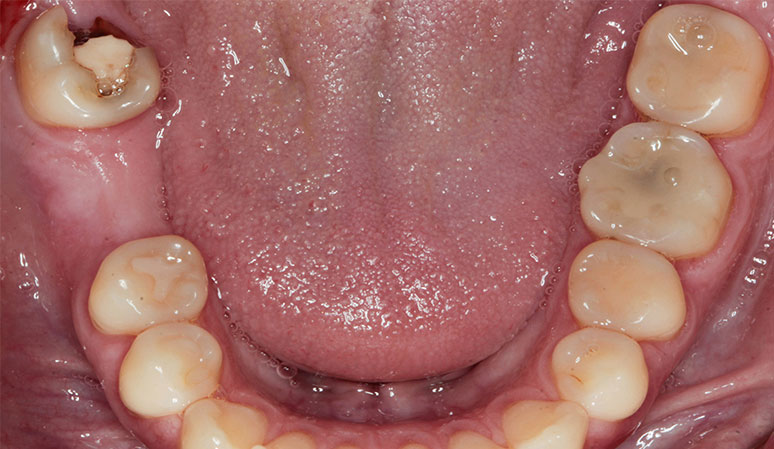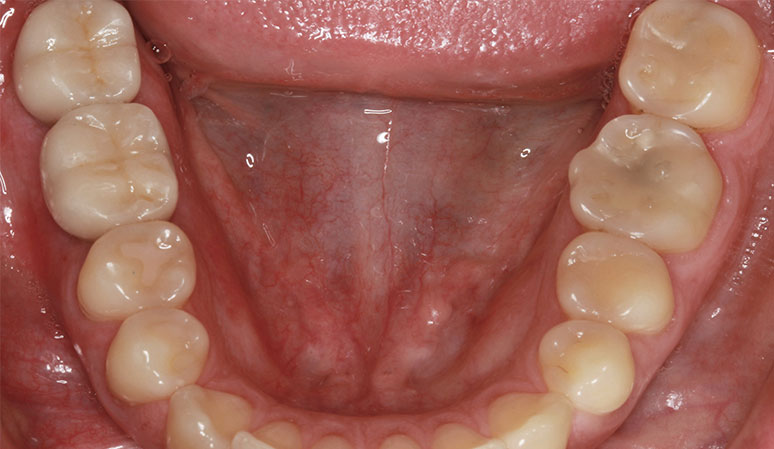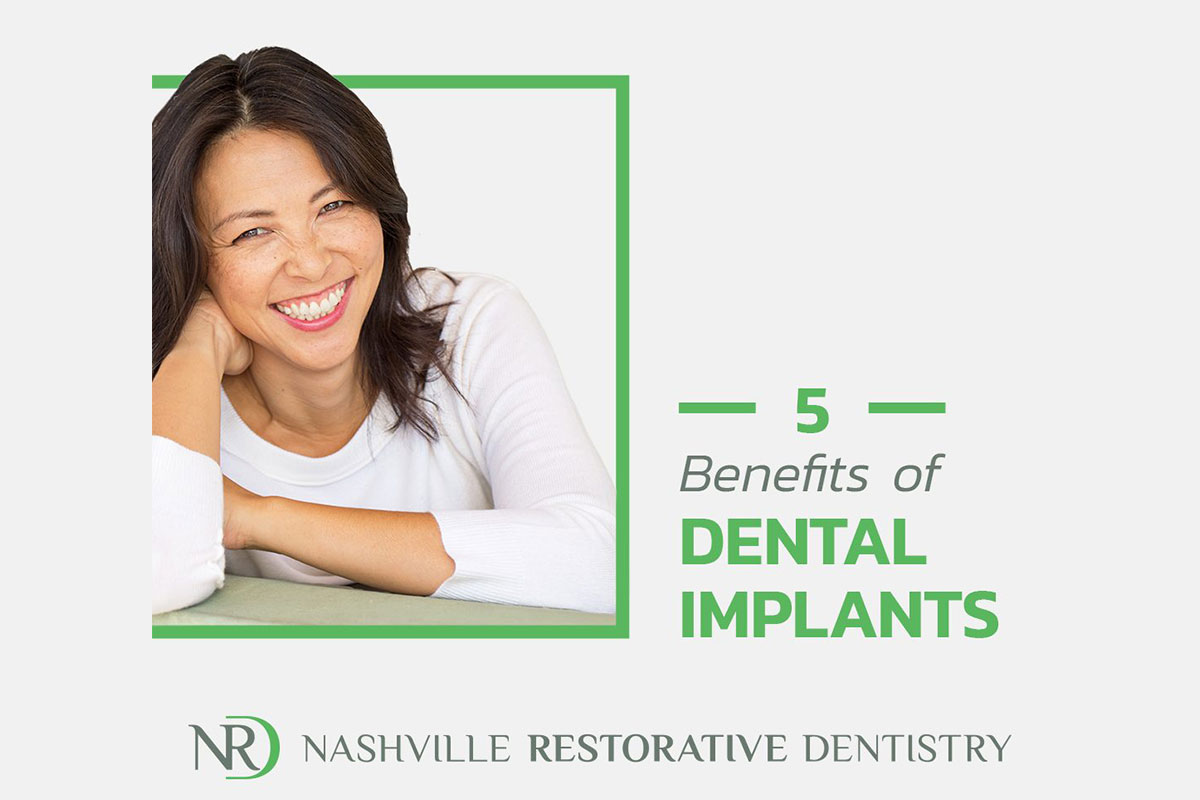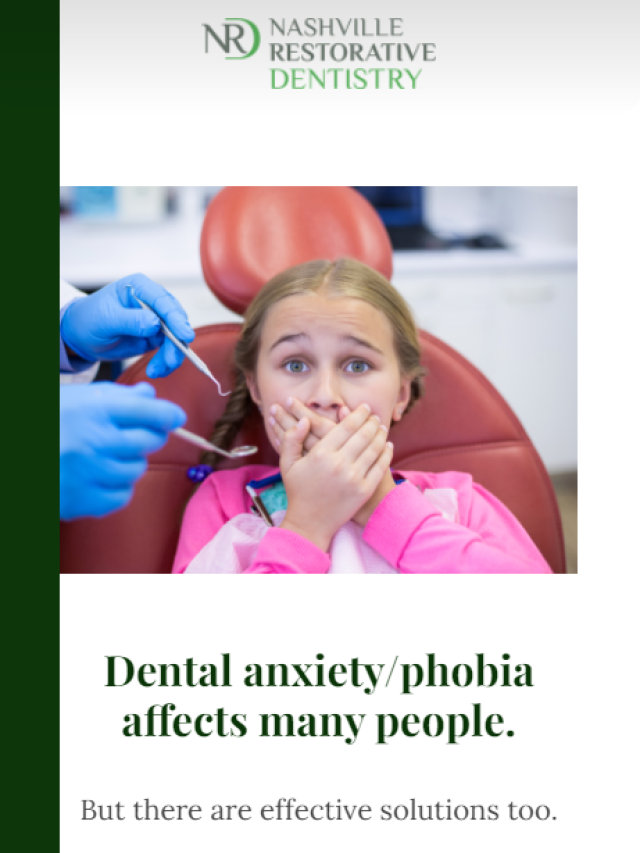Dental Implant Services in Nashville, Tennessee
Titanium and zirconia implants provide the foundation for crowns that look and function just like your natural teeth. Rediscover your smile and the confidence you’ve been missing!
Dental implants are used to replace unfixable or missing teeth. They are designed to meet your specific needs and go unnoticed next to your natural teeth. Implants are such a great option because they can be used to replace virtually any tooth without the drawbacks associated with other restorative choices (like dental bridges and dentures).
Dental implants can create the best and longest-lasting restoration available, whether you need to replace a single tooth or all your teeth.
See a collection of before and after images of implant cases we’ve completed.
Titanium Implants
The overwhelming majority of dental implants placed today are made of titanium.
LEARN ABOUT TITANIUM DENTAL IMPLANTS
Zirconia Implants
Documented allergies to titanium are very rare. But they do exist. For patients with a titanium allergy or sensitivity, or those who want to avoid metal in their body, zirconia implants provide a proven alternative.

Dr. Ryan Jones explains what dental implants are and how the procedure works. Nashville Restorative Dentistry offers titanium and zirconia implants that replace virtually any tooth without the drawbacks associated with other restorative choices like bridges and dentures. Whether you need a single tooth replaced or all of them, dental implants can be used to create the best and longest-lasting restoration available. Learn more about Nashville Restorative Dentistry’s dental implants services at the link below.


How it Works
Nashville Restorative Dentistry uses advanced technology throughout the implant process to provide the best results. Cone Beam CT scan 3D imagery is used to evaluate each case. This technology allows us to see the amount of remaining bone, determine if sufficient space is available for an implant, and rule out the presence of problematic jawbone anatomy.
CT imaging also allows us to plan the exact implant placement position that will be most successful for each individual case. A 3D printed surgical guide is then created, which supports the surgical placement of an implant exactly according to plan. This approach makes for a more predictable and less invasive procedure. It also promotes quicker healing time for the patient.
Nashville Restorative Dentistry offers two different types of dental implants: titanium and zirconia. Both are effective, but each has different attributes you should consider when selecting the best one for your mouth and situation.
What are the Benefits of Dental Implants?
Successful and long-lasting – Decades of clinical research show that implants have at least a 95% success rate. Unlike other tooth replacement options that tend to fail over time, like bridges and dentures, a well-cared-for and properly positioned implant should last a lifetime.
Natural and durable – A dental implant replaces the root of a missing tooth and is securely anchored in the jawbone. This feature allows for a new crown to be placed on the implant. Such tooth replacement resembles the lost natural tooth and recreates the same biting force and ability to eat confidently. This form of tooth replacement can also be brushed and flossed, just like a natural tooth.
No more loose dentures and partials – Implants can be used to support or anchor removable partials and dentures. Retrofitted or otherwise implant-retained partials and dentures significantly increase your comfort, chewing force, and ability to eat and talk. Our patients appreciate that they can chew confidently and speak clearly, without worrying about things shifting or becoming loose. In some cases, implants can be used to replace multiple teeth. An implant-supported dental bridge may eliminate the need for wearing a partial altogether.
Save healthy neighboring teeth – Implants allow us to fill a missing space without grinding down the adjacent teeth to make a bridge, increasing the risk of root canal treatment or tooth extraction over time. Implants also prevent the undesired shifting or tipping of teeth that can occur when spaces are left unfilled.
Value – Although the initial investment may be higher than alternative treatment choices, over a lifetime, implants provide the most cost-effective and long-term value when compared to other tooth replacement options.
How Can Implants be Used?
Replace a single tooth – The most common implant use is to replace a single missing tooth. One implant is used to replace the root of a missing tooth. After it has healed, an abutment and crown are attached to the implant to support a natural appearance and full function.
Replace many teeth in a row – In some cases, several teeth in a row have been lost. So, two implants may be placed and used as anchors for an implant bridge. This design allows for replacing multiple teeth without the unnecessary time, expense, and stress of placing an implant for each missing tooth.
Support or anchor a removable denture or partial – As few as two implants can be placed under an existing denture or partial to significantly increase its stability and the wearer’s confidence. The denture is modified or made to snap onto the implants underneath, preventing anything from coming loose while eating or falling out when talking. These implants also eliminate the need for sticky and messy denture adhesives. See some examples of cases that we’ve completed.
All-on-4, All-on-6, All-on-X to replace all teeth – If all teeth need to be replaced, as few as four to six implants in each jaw can be used to stabilize a bridge or hybrid denture. This design provides complete restoration; patients smile, eat confidently, and enjoy a variety of foods. In many cases, the implants and healing restoration can be placed the same day that the failing teeth are removed — preventing you from ever being without teeth or wearing a denture. Check out some of the amazing transformations that our team has completed.

One of the absolute coolest things that we get to do in restoring someone’s mouth health and smile and confidence is the all on x type of treatment approach so all on x just stands for whether it be four, you know six, eight implants it’s all the teeth being gone in someone’s jaw and placing a minimum of four, six if we can or more if you need to implants that one restorative prosthesis called a Hybrid Denture is attached to so if you imagine that you lost all your teeth two decades ago you didn’t have a ton of options you know you think about what a traditional denture is it’s an acrylic prosthetic that you can take in and out of your mouth that visually replaces all your teeth but isn’t held fast or stable by anything other than suction and potentially some adhesive goo that you put inside of it when we take someone that has been in that position and then can place several implants into the remaining bone and attach something like a hybrid denture to it that they can’t take in and out that can’t come loose when they eat that doesn’t cover their palate and minimize their ability to taste or enjoy food it is absolutely transformational from a confident standpoint, from a functional ability and from a cosmetic result it is amazing.



Request a FREE Virtual Consult Today
Get answers about improving your smile in three easy steps!
Upload a smile selfie or photo of an area of concern
Let us know what you want to change and we will create a personalized video with recommendations.
Upload a smile selfie or photo of an area of concern
Let us help you reclaim what you’ve been missing.
Don’t let missing teeth hold you back from eating the foods you love or confidently smiling for a picture. We are proud to serve the Greater Nashville area including Franklin, Brentwood, and Cool Springs.
Reviewr Name
Reggie R.
Patient Testimonial
Issue: Two badly infected and broken upper front teeth as well as poor alignment of his teeth overall.
Solution: Through a process involving extractions, bone grafting, and braces we were able to achieve a healthy, infection free point which allowed dental implants to be placed and utilized to replace the two missing front teeth.











